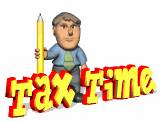
One of the most confusing parts of getting ready for tax time is knowing what documents you need to prepare your taxes. Basically, the documents break down into three categories: Income statements, deductions, and receipts.
The Challenge of Receipts
Receipts are the most challenging documents to store and organize. This is especially true if you are a small business owner. Receipts are your main protection if the IRS decides to audit and details are critical. It’s imperative to keep all receipts pertaining to business and a very good idea to get into the habit of making notes on entertainment and dining expense receipts.
Consider Scanning for Added Protection
Scanning your receipts can help solve two problems. First, if the IRS comes knocking, they won’t care that your receipts from four years ago have faded; so scanning receipts is a great way to give you that added layer of protection. Secondly, if you set up a system to scan as you go, then you won’t have to wonder where all your receipts are stored, and you won’t have to deal with that shoebox full of papers come tax time. There are many smartphone apps dedicated to receipt scanning that are easy to use and can save you hours of searching, sorting, and organizing papers during tax time.
Income Statements:
W-2 – wages and salary
W-2G – gambling winnings
Form 1099-R – retirement income
Form 1099-INT – interest
Form 1099-DIV – dividends
Form 1099-MISC – miscellaneous income, including self-employment
Form 1099-G – government payments
Form 1099-SA – MSA or HSA distributions
Form 1099-B – broker or barter exchanges
Form SSA-1099 – Social Security benefits
Form RRB-1099 – railroad retirement
Schedule K-1 – partnership income or loss
Deductions:
Form 1098 – mortgage interest
Form 1098-T – tuition
Form 1098-E – student loan interest
Receipts & Records:
Unreimbursed mileage related to work or volunteering
Charitable donations
Contributions to retirement plans
Healthcare expenses
Self-employment income and expenses, including any:
-Home-office expenses
-Health-insurance premiums paid
-Transportation costs
-Advertising fees
Rental property
Moving expenses, if you moved for a new job
Expenses for energy-efficient home improvements
Tuition or fees paid for education for you, spouse, or dependents
Retirement account rollovers
Child care and dependent care expenses, including the employer identification number (EIN) or SSN of the care provider
Additional Documents:
Your Social Security number (SSN) or taxpayer identification number (ITIN) and SSN’s or ITIN’s for spouse and dependents (if any)
Your birth date and birth date for spouse and dependents (if any)
A copy of last year’s return
Documents List Source: H&R Block




